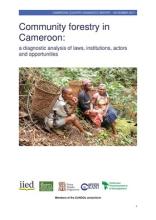/ library resources
Showing items 1 through 9 of 84.Oil palm plantations in Indonesia have been linked to substantial deforestation in the 1990s and 2000s, though recent studies suggest that new plantations are increasingly developed on non-forest land.
Forest conversion in the tropics is increasingly driven by global demand for agricultural forest-risk commodities such as soy, beef, palm oil and timber.
Las etapas iniciales del asentamiento fronterizo en la Amazonia brasileña se caracterizaron
por la gran intensidad de la afluencia de flujos migratorios, la deforestación y la rotación
de la propiedad. Cuarenta años más tarde, los hogares rurales están más orientados
La presente Resolución aprueba los Lineamientos para la ejecución del proceso de evaluación agrológica de las tierras de las comunidades nativas y la clasificación por su capacidad de uso mayor a nivel de Grupo con fines de titulación.
Article 13 shall be amended to add the following wording: “Article 13. Flora and fauna management companies. 1.
This brief study has been produced by the partners of the CoNGOs consortium to share our different knowledge and experience, and to set out a joint understanding of the current state of play in relation to community forestry in Cameroon.
Widespread palm oil production causes much controversy due to its negative impacts in the tropics. But whatever is said about it, it is big business and getting bigger by the day due to increasing global demands.
The investigative series Indonesia for Sale, co-published by The Gecko Project and Mongabay, exposes the corruption behind Indonesia’s deforestation and land rights crisis.
Pagination
Land Library Search
Through our robust search engine, you can search for any item of the over 73,000 highly curated resources in the Land Library.
If you would like to find an overview of what is possible, feel free to peruse the Search Guide.






